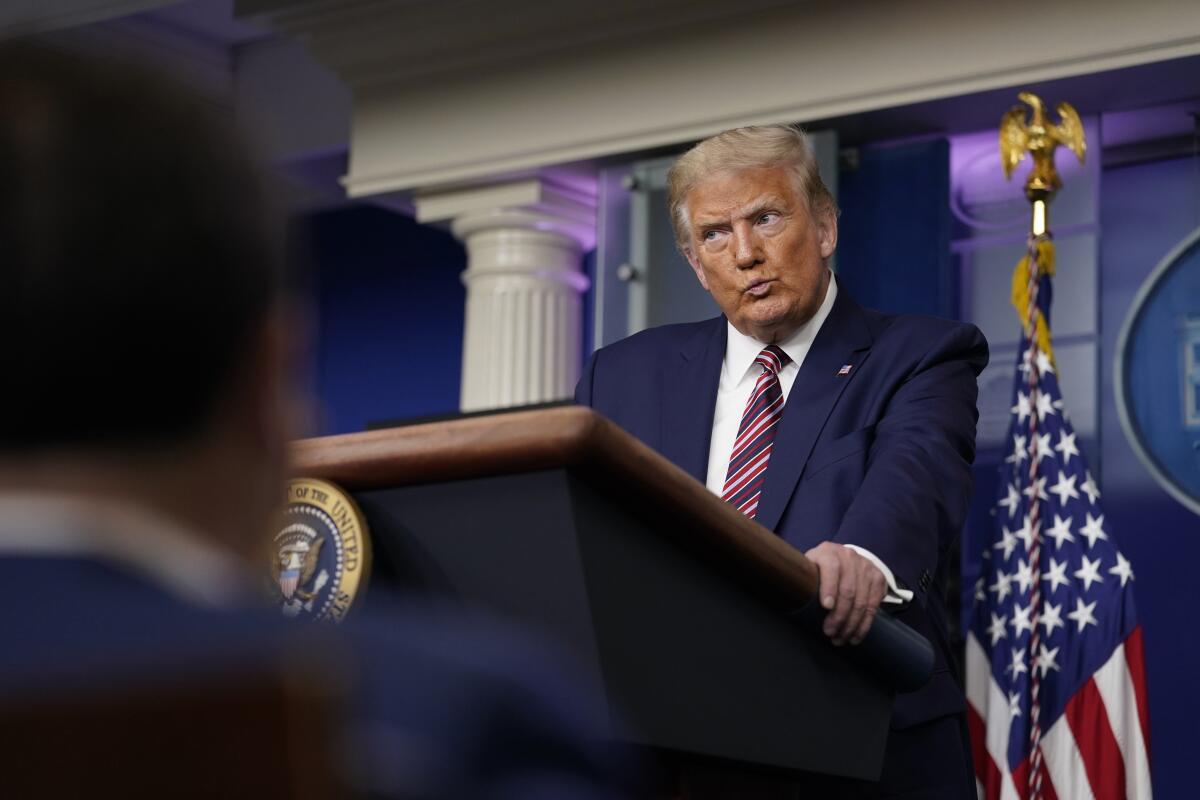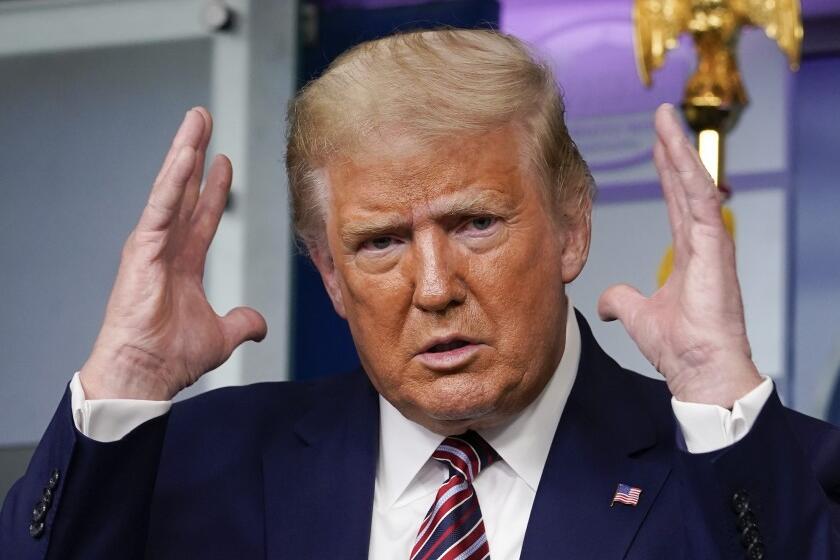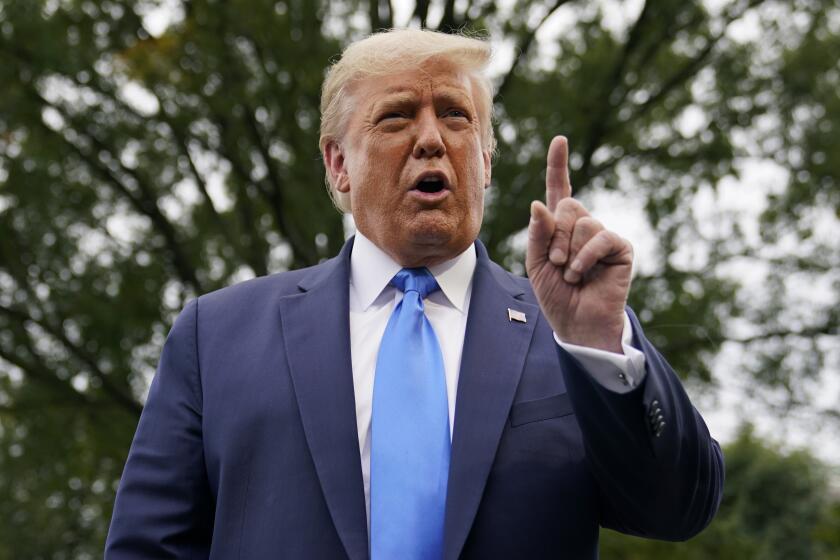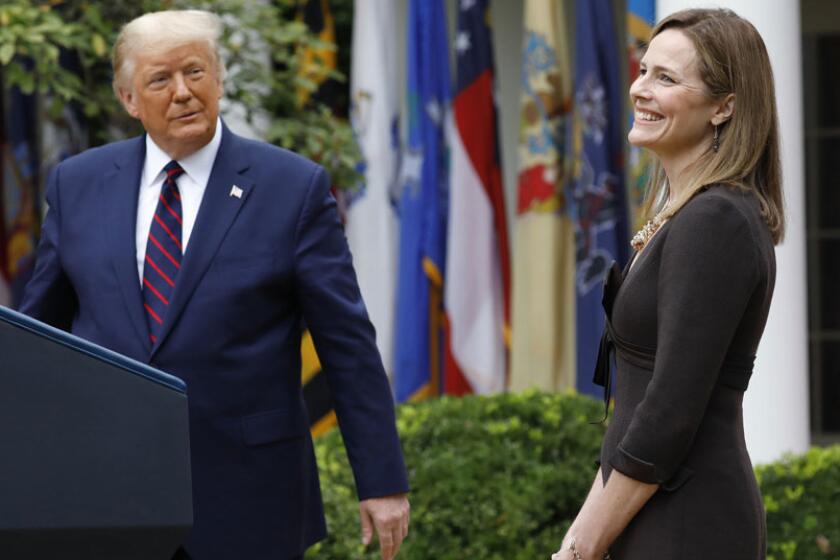Trump paid only $750 in U.S. income taxes in 2016 and 2017, New York Times reports

President Trump paid just $750 in federal income taxes the year he ran for president and in his first year in the White House, according to a report Sunday in the New York Times.
Trump, who has fiercely guarded his tax filings and is the only president in modern times not to make them public, paid no federal income taxes in 10 of the past 15 years.
The details of the tax filings complicate Trump’s description of himself as a shrewd and patriotic businessman, revealing instead a series of financial losses and income from abroad that could come into conflict with his responsibilities as president. His financial disclosures indicated he earned at least $434.9 million in 2018, but the tax filings reported a loss of $47.4 million.
The tax filings also illustrate how a reputed billionaire could pay little to nothing in taxes, while someone in the middle class could pay substantially more. Nearly half of Americans pay no income taxes, primarily because of how low their incomes are. But Internal Revenue Service figures indicate that the average tax filer paid roughly $12,200 in 2017, about 16 times more than what the president paid.
News of Trump’s tax evasion plays to Biden’s ‘Scranton-vs.-Park Ave.’ campaign. It won’t upend the race, but it’s another hurdle for Trump.
The disclosure, which the New York Times said comes from tax return data it obtained extending over two decades, comes ahead of the first presidential debate Tuesday between Trump and the Democratic presidential nominee, former Vice President Joe Biden, and weeks before the election.
Speaking at a news conference Sunday at the White House, Trump dismissed the report as “fake news” and said he has paid taxes, though he gave no specifics. Trump frequently claims that articles unfavorable to him are “fake news.”
He also vowed that information about his taxes “will all be revealed,” but he offered no timeline for the disclosure. He made similar promises, and failed to follow through on them, during the 2016 campaign.
In fact, the president has fielded court challenges against those seeking access to his returns, including the U.S. House of Representatives, which is suing for access to his tax returns as part of congressional oversight.

During his first two years as president, Trump received $73 million from foreign operations, which, in addition to his golf properties in Scotland and Ireland, included $3 million from the Philippines, $2.3 million from India and $1 million from Turkey, among other nations, according to the Times report. The president in 2017 paid $145,400 in taxes in India and $156,824 in the Philippines, compared with just $750 in U.S. income taxes. The Times said the tax records did not reveal any unreported connections to Russia.
Trump found multiple ways to reduce his tax bills. He has taken tax deductions on personal expenses such as housing and aircraft, as well as $70,000 to style his hair while he filmed “The Apprentice.” Losses in the property businesses solely owned and managed by Trump appear to have offset income from his stake in “The Apprentice” and other entities with multiple owners.
Trump’s refusal to say that he’d peacefully transfer power may just be bluster. But there are steps he could take, and Democrats are on the alert.
During the first two years of his presidency, Trump relied on business tax credits to reduce his tax obligations. The Times report said $9.7 million worth of business investment credits that were submitted after Trump requested an extension to file his taxes allowed him to reduce his income and pay just $750 in both 2016 and 2017.
Income tax payments help finance the military and domestic programs.
Trump, starting in 2010, claimed and received an income tax refund that totaled $72.9 million, which the Times said was at the core of an ongoing audit by the IRS. The Times said a ruling against Trump could cost him $100 million or more.
The president could also face mounting financial pressure in the years ahead. The tax records show he’s carrying a total of $421 million in loans and debt that are primarily due within four years. Most of that debt comes from the Trump National Doral golf resort in Florida ($125 million) and the Trump International Hotel in Washington ($160 million), two properties the Times said are struggling financially.
U.S. Rep. Richard E. Neal (D-Mass.), the chairman of the House Ways and Means Committee who has tried unsuccessfully to obtain Trump’s tax records, said the Times report makes it even more essential for his committee to get the documents.
“It appears that the president has gamed the tax code to his advantage and used legal fights to delay or avoid paying what he owes,” Neal wrote in a statement. “Now, Donald Trump is the boss of the agency he considers an adversary. It is essential that the IRS’ presidential audit program remain free of interference.”
A lawyer for the Trump Organization, Alan Garten, and a spokesperson for the Trump Organization did not immediately respond to a request for comment from the Associated Press on the report.
Garten told the New York Times that “most, if not all, of the facts appear to be inaccurate.”
Amid incendiary published revelations about Trump finances, Democrats determined to exact a political price if Trump’s Supreme Court nominee is confirmed.
He said in a statement to the news organization that the president “has paid tens of millions of dollars in personal taxes to the federal government, including paying millions in personal taxes since announcing his candidacy in 2015.”
The New York Times said it declined to provide Garten with the tax filings in order to protect its sources but said the sources had legal access to the records.
During the first general election debate in 2016, Trump’s opponent, former Secretary of State Hillary Clinton, said that perhaps the Republican wasn’t releasing his tax returns because he had paid nothing in federal taxes.
Trump interrupted her to say, “That makes me smart.”
More to Read
Get the L.A. Times Politics newsletter
Deeply reported insights into legislation, politics and policy from Sacramento, Washington and beyond. In your inbox three times per week.
You may occasionally receive promotional content from the Los Angeles Times.













